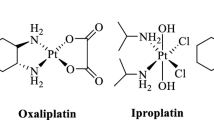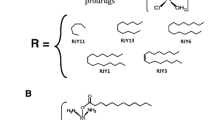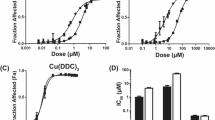Abstract
This work presents a deeper pharmacological evaluation of two formerly prepared and characterized, and highly in vitro cytotoxic platinum(II) oxalato complexes [Pt(ox)(L1)2] (1) and [Pt(ox)(L2)2] (2), containing the derivatives of cyclin-dependent kinase inhibitor (CDKi) seliciclib ((R)-roscovitine, CYC202) coordinating as N-donor carrier ligands, i.e., 2-(1-ethyl-2-hydroxyethylamino)-N6-(4-methoxybenzyl)-9-isopropyladenine (L1) and 2-chloro-N6-(2,4-dimethoxybenzyl)-9-isopropyladenine (L2). The positive results of in vitro cytotoxicity screening on human cancer cell lines (HeLa, HOS, A2780, A2780R, G361 and MCF7 with IC50 at low micromolar levels) published previously, motivated us to perform extended preclinical in vitro experiments to reveal the mechanisms associated with the induction of cancer cell death. In addition, the in vivo antitumor activity was evaluated using the mouse lymphocytic leukaemia L1210 model. The obtained results revealed that complex 1 exceeds the antitumor effect of cisplatin (as for the extension of life-span of mice) and shows far less adverse effects as compared to reference drug cisplatin. The in vitro and ex vivo studies of cellular effects and molecular mechanisms of cell death induction showed that the mechanism of action of complex 1 is essentially different from that of cisplatin. The obtained results showed a possible way how to obtain antitumor active platinum(II) oxalato complexes with better therapeutic profile than contemporary used platinum-based therapeutics.




Similar content being viewed by others
Abbreviations
- Casp:
-
Caspase
- CDK:
-
Cyclin-dependent kinase
- CDKi:
-
Cyclin-dependent kinase inhibitor
- PBS:
-
Phosphate-buffered saline
- PI:
-
Propidium iodide
- Ctrl:
-
Control
References
Kelland L (2007) Nat Rev Cancer 7:573–584. https://doi.org/10.1038/nrc2167
Štarha P, Trávníček Z, Popa I (2010) J Inorg Biochem 104:639–647. https://doi.org/10.1016/j.jinorgbio.2010.02.005
Trávníček Z, Štarha P, Popa I, Vrzal R, Dvořák Z (2010) Eur J Med Chem 45:4609–4614. https://doi.org/10.1016/j.ejmech.2010.07.025
Vrzal R, Štarha P, Dvořák Z, Trávníček Z (2010) J Inorg Biochem 104:1130–1132. https://doi.org/10.1016/j.jinorgbio.2010.07.002
Raymond E, Faivre S, Chaney S, Woynarowski J, Cvitkovic E (2002) Mol Cancer Ther 1:227–235
Štarha P, Hošek J, Vančo J, Dvořák Z, Suchý P, Popa I, Pražanová G, Trávníček Z (2014) PLoS One 9:e90341. https://doi.org/10.1371/journal.pone.0090341
Trávníček Z, Matiková-Maľarová M, Novotná R, Vančo J, Štěpánková K, Suchý P (2011) J Inorg Biochem 105:937–948. https://doi.org/10.1016/j.jinorgbio.2011.04.002
Nair BC, Vallabhaneni S, Tekmal RR, Vadlamudi RK (2011) Breast Cancer Res 13:R80. https://doi.org/10.1186/bcr2929
William-Faltaos S, Rouillard D, Lechat P, Bastian G (2006) Anticancer Res 26:2093–2099
Noji M, Kizu R, Takeda Y, Akiyama N, Yoshizaki I, Eriguchi M, Kidani Y (2005) Biomed Pharmacother 59:224–229. https://doi.org/10.1016/j.biopha.2004.06.006
Porter AG, Jänicke RU (1999) Cell Death Differ 6:99–104. https://doi.org/10.1038/sj.cdd.4400476
Dasari S, Tchounwou PB (2014) Eur J Pharmacol 740:364–378. https://doi.org/10.1016/j.ejphar.2014.07.025
Zajac J, Kostrhunova H, Novohradsky V, Vrana O, Raveendran R, Gibson D, Kasparkova J, Brabec V (2016) J Inorg Biochem 156:89–97. https://doi.org/10.1016/j.jinorgbio.2015.12.003
Acknowledgements
The authors thank Dr. Kateřina Kubešová for preparation of the cell pellets for the flow cytometry studies, Dr. Pawel Jewula for performing flow cytometry experiments, and Ms. Gabriela Pražanová for performing a part of immunohistochemical evaluations. This research was funded by the Ministry of Education, Youth and Sports of the Czech Republic (project LO1305).
Author information
Authors and Affiliations
Corresponding author
Ethics declarations
Conflict of interest
There are no conflicts to declare.
Additional information
Publisher's Note
Springer Nature remains neutral with regard to jurisdictional claims in published maps and institutional affiliations.
Electronic supplementary material
Below is the link to the electronic supplementary material.
Rights and permissions
About this article
Cite this article
Vančo, J., Štarha, P., Hošek, J. et al. Platinum(II)-oxalato complexes of seliciclib (CYC202) derivatives show different cellular effects and lesser adverse effects in mouse lymphoma model than cisplatin. J Biol Inorg Chem 25, 67–73 (2020). https://doi.org/10.1007/s00775-019-01735-5
Received:
Accepted:
Published:
Issue Date:
DOI: https://doi.org/10.1007/s00775-019-01735-5




